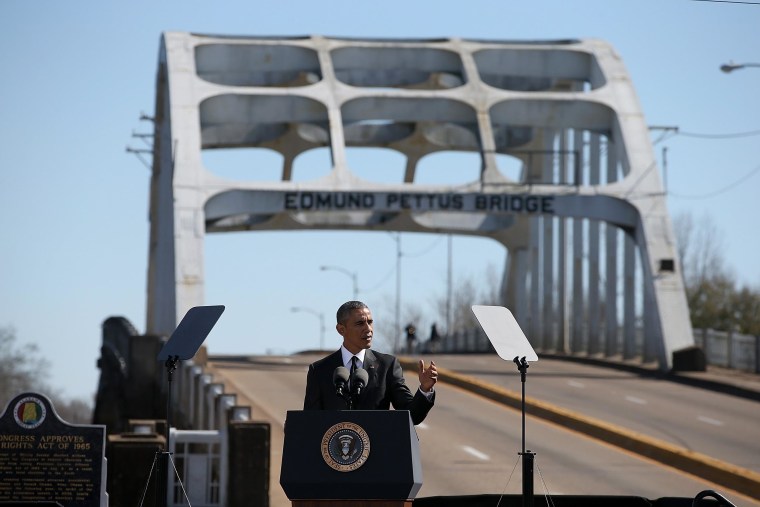The 50th anniversary march in Selma Alabama was a wonderful montage of where racial politics and justice in America are in the early part of the 21st century.
Everywhere you turned there were stark contrasts: the politicians and old guard on Saturday, the activists on Sunday, thousands of visitors spending money on trinkets and souvenirs while the neighborhood around the Edmund Pettus Bridge is destitute, the mixed crowd by the local police and firemen segregated, the visuals were interesting.
But nothing was more telling than President Obama, who over the course of 24 hours probably laid bare his most basic beliefs about race in America for the nation to see, if only people were willing to actually listen to him.
President Obama is being rightly praised by members of Congress, pundits and activists for his speech on the steps of the Edmund Pettus Bridge on Saturday. He passionately pointed out that progress has been made in race relations in America, and to cynically suggest that “nothing’s changed” in 50 years is to deny the progress of women CEO’s, Latinos, African Americans and the LGBT community. Moreover, he pointed out that what happened in Ferguson wasn’t isolated but nor was it endemic (a point that many have taken issue with).
True commitment to civil rights requires speaking the same painful truths to crowds of the powerful and weak, to the committed and the disinterested to the converted and those full of contempt.
However, to bolster this point, President Obama pointed out that what the Ferguson Police Department has been doing is no longer LEGAL which was not the case 50 years ago, yet another sign of progress. This is president Obama, the man who believes in the constitution (when it comes to civil rights, not press freedom), who will use the power of the government to go after institutions that violate the rights of people based on race, color, creed or sexuality.
This is a president that even most cynical African Americans can get behind, especially when he’s channeling Martin Luther King Jr. with a backdrop of one of the most significant places in the history of American Civil Rights.
But then again, he is also the same President who spoke to Benedict College in South Carolina on Friday.
President Obama spoke to a group of students at Benedict College last Friday and provided that contrast to his personality and philosophy on race that infuriates and disappoints many in the African American community. It was a Cosby-esque cavalcade of respectability politics. The president chastised the students to work harder, show more responsibility and handle their business. Comments that are not in and of themselves problematic, but ones that he seems to only throw out when talking to African American audiences.
When one student asked him about the crisis at the HBCU South Carolina State the president glibly replied that you can “…still get a good education from a bad school.” That’s all well and good Mr. President but what happens when you no longer HAVE a school? The president doesn’t really have an answer for that, and in fact, still places all too many of the conditions of African Americans on issues of self – reliance and accountability.
In other words, for all of the grace and pageantry of his words on Saturday the president remains incredibly situational about his Civil Rights passion, which is in stark contrast to the men and women he came to honor that day.
The difficulty of this for those who support the president specifically or even progressive politics in general is obvious. How is it, that a political leader who aggressively attempted to protect the rights of the poor and minorities to vote, and has come down hard on police departments (even before Ferguson) is also quick to blame black folks for all of their own problems?
If Obama had delivered his Selma speech to the students at Benedict it would be amazing, and had he delivered his Benedict speech in front of the Congressional Black Caucus and the dignitaries on Saturday they’d have wanted to boo him off stage.
In other words, for all of the grace and pageantry of his words on Saturday the president remains incredibly situational about his Civil Rights passion, which is in stark contrast to the men and women he came to honor that day.
True commitment to civil rights requires speaking the same painful truths to crowds of the powerful and weak, to the committed and the disinterested to the converted and those full of contempt. Despite his impressive speech on Saturday President Obama still does not seem to have that level of strength or candor within him.
But despite his ambivalence or disinterest he is in the position to make those speeches because of men and women who weren’t willing to shy away from the layered influence of institutional racism 50 years ago.
